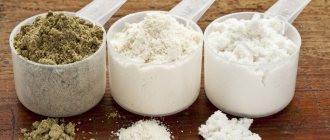What are BCAA's?
BCAA is a group consisting of 3 essential α-amino acids with branched side chains: leucine, isoleucine and valine.
They are not synthesized in the body, so they must be supplied in sufficient quantities with food. Alpha amino acids are structural elements of proteins: in fact, amino acids arranged in peptide chains are proteins. And the amino acids included in the BCAA group make up about 20–25% of the peptide chains of almost all protein compounds. Based on this, we can say that amino acids, like protein, perform the function of synthesizing body tissue, especially muscle tissue. However, almost all dietary supplements are not limited to just one function. This rule also applies to the BCAA group; it has the following effects on the human body:
- In critical situations, they act as sources of energy, as they participate in the process of glucose synthesis.
- Participates in energy metabolism: regulates the processes of protein synthesis and degradation, cell growth, secretion of certain hormones, for example, insulin or serotonin.
- Slightly reduces sensitivity to pain, cold and heat (mainly due to the action of valine).
Thanks to these qualities, BCAA increases muscle endurance during training, protects muscle tissue from destruction and accelerates its recovery.
BCAA or protein
Almost every athlete knows about the positive benefits of protein and essential amino acids. But not everyone knows what exactly is the difference between these sports nutrition products. It is important to know that protein includes BCAAs, which are involved in the process of muscle fiber synthesis and reduce damage within the muscles after intense strength training. Next, we'll look at whether you need to take large amounts of protein, or whether BCAAs may provide the most pronounced effect. Protein: effects on muscles The basic function of protein is to ensure a positive nitrogen balance, which is a necessary condition for the implementation of natural anabolic processes. This condition is necessary for active growth and restoration of muscles after active and long-term exercise. Accordingly, protein should be present in the diet of every athlete. High-quality protein for sports supplements is synthesized from products of plant and animal origin, most often from soybeans and whey. Whey protein It is quite popular among professional athletes. This fact is easily explained: this product, compared to vegetable protein, contains a high concentration of BCAA and other amino acids in a bioavailable form. It is worth remembering that whey protein includes cysteine and methionine, which can be converted into glutathione, one of the key antioxidants. It removes metabolic products from cells and protects them from harmful factors. The varieties of milk protein are isolate and concentrate. The concentrate includes a large amount of glycomacropeptides with the presence of casein, which ensures regular replenishment of muscle fibers over a certain period of time. The isolate has a better absorption rate of nutritional components, which speeds up recovery and increases lean muscle weight in the body. The use of whey protein in the post-workout period guarantees a positive nitrogen balance, promoting muscle protein synthesis and active muscle growth. In recent years, most brands have included alpha-lactalbumin, beta-lactoglobulin or glycomacropeptides in their protein supplements, which are the main biological sources of valuable amino acids, including BCAA. Soy protein Includes a fairly large number of BCAA amino acids and natural antioxidants that reduce cholesterol levels in the composition. There is a common belief among athletes that soy protein is harmful because it can reduce testosterone levels and cause negative changes in muscle mass. It is worth noting that there is quite a lot of evidence that such a protein is characterized by beneficial properties for the body, since it is thoroughly purified and presented in isolate form.
BCAA Consist of leucine, isoleucine and valine - the most important essential amino acids that are necessary for the proper functioning of muscle fiber production mechanisms. During intense training, under the influence of a variety of natural factors, BCAAs quickly oxidize, and their breakdown products can be used to reduce muscle damage, improve protein production and increase energy reserves. Thanks to scientific research, it has been determined that the use of even small doses of BCAA immediately before heavy training can reduce the intensity of pain in the muscles. Consuming these amino acids is known to significantly reduce cortisol levels. This hormone has typical catabolic characteristics: it activates the destruction of protein, the accumulation of fatty tissue and an increase in glucose levels in the blood. BCAAs can also increase testosterone and growth hormone levels. Today, BCAAs are quite often included in the daily menu of athletes. Nutritionists note that amino acids have a much more intense effect on performance than protein. However, the use of BCAA supplements is characterized by varying effectiveness (a whole list of factors influences them: muscle mass, physical characteristics, etc.). At this stage, it is difficult to determine what is more effective. It is necessary to take into account a large number of features: the frequency and characteristics of strength training, the physical characteristics of the athlete, etc. There are also common features: it is better to consume protein and BCAA before and after strength training. Experts have identified the following characteristics: • BCAA stimulates the growth of muscle fibers, improves recovery and increases endurance; • Whey protein promotes lean muscle growth.
What is protein?
Protein or proteins are organic compounds consisting of amino acids arranged in peptide chains. In Russia, the word “protein” is most often used for sports supplements, and “proteins” is used to denote the content of these same proteins in any food. But in fact, these words are synonyms and mean the same organic compounds. When entering the body with food, proteins are broken down into amino acids, which are subsequently used as a source of energy or arranged in peptide chains for the synthesis of other types of proteins needed by the body at the moment.
Proteins are one of the most important parts of human nutrition, without which the body simply cannot function. Their role for humans is enormous:
- They are used to build the cytoskeleton of our body cells. First of all, proteins are needed for the synthesis of connective tissue cells, muscle fibers, hair and nails.
- They act as catalysts for many chemical reactions.
- They protect the body from physical and chemical influences, and also strengthen the human immune system.
- They transport some molecules within the body, for example, hemoglobin carries oxygen from the lungs to other parts of the body, and returns collected carbon dioxide to the lungs.
And this is not a complete list of protein functions, but the very nature of proteins is heterogeneous: depending on the composition and structure of the peptide bond, there are a large number of proteins of various types. By taking dietary supplements with protein, a person receives proteins that will break down into a certain set of amino acids. They can be converted to other non-essential amino acids, but in most cases will be used in their original state. This means that taking protein will not provide all of the listed benefits to the same extent. The main role of protein supplements is to accelerate muscle growth by providing a sufficient amount of “building material” and increasing energy reserves when carbohydrates and other energy sources become insufficient.
What is BCAA
Among the variety of amino acids, BCAAs are definitely in first place in terms of importance for muscle growth.
They contain three amino acids - valine, leucine and isoleucine.
They are classified as essential, that is, those that are not synthesized in the body independently. About 30% of muscle tissue consists of them.
The term comes from the English Branched Chain Amino Acids - amino acids with branched side chains.
With their help, various biochemical reactions occur in the muscle cell:
- Restoring muscle microdamage after strength training
- Increased physical performance during the lesson
- Act as an alternative source of energy in the muscle cell
- Protect muscles from breakdown
- Participate in the synthesis of other amino acids (glutamine, alanine)
The largest amount of BCAAs is found in natural protein products of animal origin. Vegetable protein is inferior in this indicator.
With intense power loads, the body's need for BCAAs increases. To ensure their supply in the required quantity, bodybuilding has adopted additional intake of this substance in the form of a dietary supplement.
According to the release form, there are powder, tablets, capsules and liquid forms. With their advantages and disadvantages, they all provide approximately the same effect.
How to drink protein and BCAA?
The dosage of BCAA is calculated based on the amount of leucine: about 33–35 mg is required per 1 kg of weight. If the standard ratio of amino acids in sports supplements is 2:1:1 (leucine, isoleucine, valine), then a person weighing 75 kg should take about 5 grams of BCAA per day. It is also important to consider the time of administration: the optimal moment is right before or immediately after training. BCAA is also effective immediately after waking up to quickly fill the body depleted during the night with amino acids.
Protein dosage is calculated more simply: 1–2 grams per 1 kg of body weight. The more frequent and intense the training, the closer the dosage should be to 2 g/kg. The second factor in choosing dosage is nutrition: if an athlete eats a lot of meat, dairy products and other protein-rich foods, then the need for protein supplements is reduced. When digested, proteins are broken down into amino acids; this process takes time, so the moment of taking the dietary supplement does not play an important role. The main thing is to consistently consume the daily requirement every day.
Protein and BCAA: are there any differences?
So, BCAA is a set of three specific amino acids, and protein is a substance consisting of many similar amino acids. There are only 2 main differences between BCAA and protein:
- When protein enters the body, it is broken down into amino acids, and the amino acids are absorbed in their original form.
- BCAA contains only 3 basic and most essential amino acids. And protein is made up of many different alpha amino acids, including the BCAA group.
However, these differences do not help answer the question: which is better, protein or BCAA? The fact is that each body is unique, so the effect of different dietary supplements varies among people. Moreover, even for the same person, one dietary supplement can have different effects at different times. The effect of a particular supplement depends on the state of a person’s health, his diet and the deficiency or surplus of any substances. If one of the dietary supplements brings a greater effect at one point, you should not drink it non-stop. The use of nutritional supplements, like all nutrition in general, should be varied and balanced: you should not give up BCAA in favor of protein or vice versa. Both dietary supplements have a powerful effect on the development of athletes' muscles.
Can I take BCAA with protein?
Although BCAA and protein are of the same nature, they go well together. To speed up muscle development, many athletes take BCAA and protein together. But based on the fact that the protein already contains a BCAA group, the question arises: are BCAA really necessary if you take protein? The answer to this question is individual for each athlete:
- With frequent and high-quality training, taking supplements together will accelerate muscle growth and development. BCAA is absorbed faster, so it will charge and nourish the body immediately after taking it, and protein will provide the necessary amount of protein, which will be absorbed for a long time.
- On the contrary, with infrequent, short and light training, the combined use of supplements may become excessive. Beginners do not need to create complexes of dietary supplements: it is enough to alternate courses of BCAA, protein and other dietary supplements.
But sometimes you want to achieve the effect as quickly as possible, and then the question still arises: how to combine protein and BCAA?
How to take BCAA with protein together?
If the training is truly grueling, then it will only bring benefits if you eat well. Our body will need a sufficient amount of protein, otherwise the muscles will take a long time to recover, and training can only do harm. To provide the body with protein and amino acids, BCAA and whey protein are taken according to the following scheme:
- In the morning after waking up, you can take both a protein supplement and BCAA.
- 30–40 minutes before the start of your workout, you need to take the protein again.
- BCAA is taken right before the start of a workout or immediately after it ends.
- After 20–30 minutes, a portion of protein is taken again.
Important! This regimen is used only for whey-type protein supplements. Casein takes much longer to digest, so it is consumed at night or during long breaks between meals.
Delivery throughout Russia You can order sports nutrition in the KULTURIST#1 online store anywhere in Russia.
More detailed information about delivery can be found on the “Delivery and Payment” page. Addresses of retail stores #1 St. Petersburg Stachek Avenue 96k3, st. m. Avtovo
#2 Novorossiysk st. Yuzhnaya, 21
#3 Sochi st. 20th Mountain Rifle Division, 18a
So, which is better: protein or BCAA?
All of the above arguments and research show that protein, especially whey, is a much more beneficial supplement than BCAAs for the following reasons:
- It already contains enough BCAA for any purpose.
- Whey protein has much higher bioavailability.
- Taken individually, BCAAs can cause competition and imbalance if overused. With protein, this possibility is eliminated because it contains a healthy ratio of all amino acids.
- Whey protein is cheap, healthy, and generally an adequate source of protein in the diet.
This seems to be a sufficient amount of evidence.
BCAA, creatine and protein: how to take a complex of 3 supplements?
Creatine monohydrate is another effective supplement that will enhance your workout performance. Unlike BCAA and protein, it does not have an amino acid base and is taken to replenish the level of ATP - a universal source of energy for all biochemical processes.
If you take BCAA, creatine, and protein together, then the above regimen is followed, but 2 doses of creatine monohydrate are added to it. It should be consumed with meals, the daily dosage is 3–6 grams.
Return to list
Amino acids
Bcaa amino acids are a powerful complex designed for rapid muscle recovery. It is almost instantly absorbed by the body and reaches its destination, feeding muscle fibers with energy. There are three main components of bca amino acids: leucine, isoleucine and valine. The body is not able to produce them, so they can only be obtained through food.
Taking bcaa amino acids allows you to speed up metabolism, increase the effectiveness of training, lose (or gain) weight and maintain it at the same level for a long time. One serving is enough to increase endurance and withstand even very difficult workouts.
Depending on the task at hand, BCAA can be taken in different ways:
- For weight loss - before exercise, during (if we are talking about soluble forms) and after. For faster weight loss, you need to drink amino acids between meals (this will reduce your appetite).
- For weight gain, taking bcaa is important before, during and after working out in the gym. At the same time, it is advisable to add a few tablespoons of sugar to the amino acids, which guarantees an additional effect from fast carbohydrates. It would be a good idea to take a portion after waking up to preserve muscle fibers from destruction.
Amino acids come in two different forms:
- in powder (soluble version). Has maximum efficiency. Half of the composition of this complex is leucine. The disadvantage of this form is the unpleasant taste;
- in capsules. The main advantage is salvation from unpleasant taste. But the essence of amino acids is lost - the high rate of breakdown in the body and delivery to the muscles. The process is slowed down by the capsule, which takes time to dissolve.











